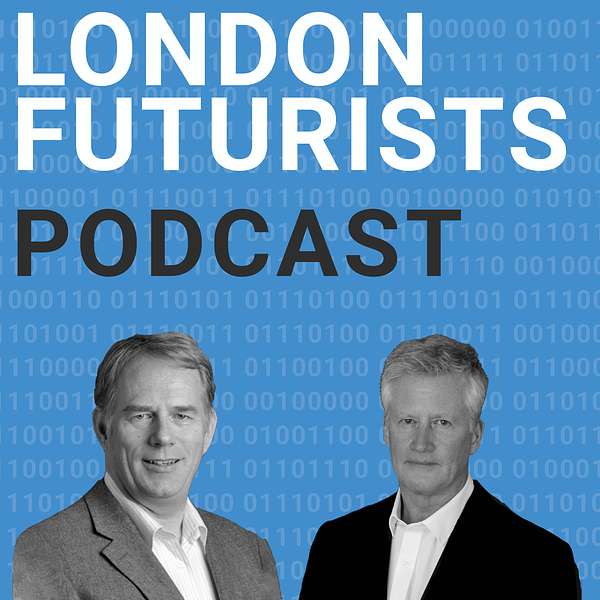
London Futurists
Anticipating and managing exponential impact - hosts David Wood and Calum Chace
Calum Chace is a sought-after keynote speaker and best-selling writer on artificial intelligence. He focuses on the medium- and long-term impact of AI on all of us, our societies and our economies. He advises companies and governments on AI policy.
His non-fiction books on AI are Surviving AI, about superintelligence, and The Economic Singularity, about the future of jobs. Both are now in their third editions.
He also wrote Pandora's Brain and Pandora’s Oracle, a pair of techno-thrillers about the first superintelligence. He is a regular contributor to magazines, newspapers, and radio.
In the last decade, Calum has given over 150 talks in 20 countries on six continents. Videos of his talks, and lots of other materials are available at https://calumchace.com/.
He is co-founder of a think tank focused on the future of jobs, called the Economic Singularity Foundation. The Foundation has published Stories from 2045, a collection of short stories written by its members.
Before becoming a full-time writer and speaker, Calum had a 30-year career in journalism and in business, as a marketer, a strategy consultant and a CEO. He studied philosophy, politics, and economics at Oxford University, which confirmed his suspicion that science fiction is actually philosophy in fancy dress.
David Wood is Chair of London Futurists, and is the author or lead editor of twelve books about the future, including The Singularity Principles, Vital Foresight, The Abolition of Aging, Smartphones and Beyond, and Sustainable Superabundance.
He is also principal of the independent futurist consultancy and publisher Delta Wisdom, executive director of the Longevity Escape Velocity (LEV) Foundation, Foresight Advisor at SingularityNET, and a board director at the IEET (Institute for Ethics and Emerging Technologies). He regularly gives keynote talks around the world on how to prepare for radical disruption. See https://deltawisdom.com/.
As a pioneer of the mobile computing and smartphone industry, he co-founded Symbian in 1998. By 2012, software written by his teams had been included as the operating system on 500 million smartphones.
From 2010 to 2013, he was Technology Planning Lead (CTO) of Accenture Mobility, where he also co-led Accenture’s Mobility Health business initiative.
Has an MA in Mathematics from Cambridge, where he also undertook doctoral research in the Philosophy of Science, and a DSc from the University of Westminster.
London Futurists
Collapsing AGI timelines, with Ross Nordby
How likely is it that, by 2030, someone will build artificial general intelligence (AGI)?
Ross Nordby is an AI researcher who has shortened his AGI timelines: he has changed his mind about when AGI might be expected to exist. He recently published an article on the LessWrong community discussion site, giving his argument in favour of shortening these timelines. He now identifies 2030 as the date by which it is 50% likely that AGI will exist. In this episode, we ask Ross questions about his argument, and consider some of the implications that arise.
Article by Ross: https://www.lesswrong.com/posts/K4urTDkBbtNuLivJx/why-i-think-strong-general-ai-is-coming-soon
Effective Altruism Long-Term Future Fund: https://funds.effectivealtruism.org/funds/far-future
MIRI (Machine Intelligence Research Institution): https://intelligence.org/
00.57 Ross’ background: real-time graphics, mostly in video games
02.10 Increased familiarity with AI made him reconsider his AGI timeline
02.37 He submitted a grant request to the Effective Altruism Long-Term Future Fund to move into AI safety work
03.50 What Ross was researching: can we make an AI intrinsically interpretable?
04.25 The AGI Ross is interested in is defined by capability, regardless of consciousness or sentience
04.55 An AI that is itself "goalless" might be put to uses with destructive side-effects
06.10 The leading AI research groups are still DeepMind and OpenAI
06.43 Other groups, like Anthropic, are more interested in alignment
07.22 If you can align an AI to any goal at all, that is progress: it indicates you have some control
08.00 Is this not all abstract and theoretical - a distraction from more pressing problems?
08.30 There are other serious problems, like pandemics and global warming, but we have to solve them all
08.45 Globally, only around 300 people are focused on AI alignment: not enough
10.05 AGI might well be less than three decades away
10.50 AlphaGo surprised the community, which was expecting Go to be winnable 10-15 years later
11.10 Then AlphaGo was surpassed by systems like AlphaZero and MuZero, which were actually simpler, and more flexible
11.20 AlphaTensor frames matrix multiplication as a game, and becomes superhuman at it
11.40 In 2018, the Transformer paper was published, but no-one forecast GPT-3’s capabilities
12.00 This year, Minerva (similar to GPT-3) got 50% correct on the math dataset: high school competition math problems
13.16 Illustrators now feel threatened by systems like Dall-E, Stable Diffusion, etc
13.30 The conclusion is that intelligence is easier to simulate than we thought
13.40 But these systems also do stupid things. They are brittle
18.00 But we could use transformers more intelligently
19.20 They turn out to be able to write code, and to explain jokes, and do maths reasoning
21:10 Google's Gopher AI
22.05 Machines don’t yet have internal models of the world, which we call common sense
24.00 But an early version of GPT-3 demonstrated the ability to model a human thought process alongside a machine’s
27.15 Ross’ current timeline is 50% probability of AGI by 2030, and 90+% by 2050
27:35 Counterarguments?
29.35 So what is to be done?
30.55 If convinced that AGI is coming soon, most lay people would probably demand that all AI research stops immediately. Which isn’t possible
31.40 Maybe publicity would be good in order to generate resources for AI alignment. And t
Elevate how you lead with insight from today’s most influential executives.
Listen on: Apple Podcasts Spotify

